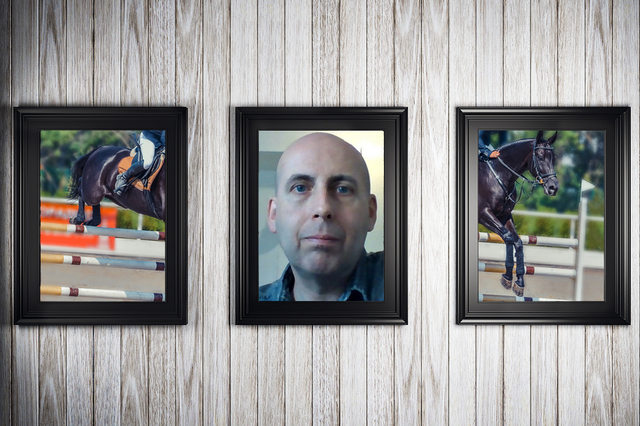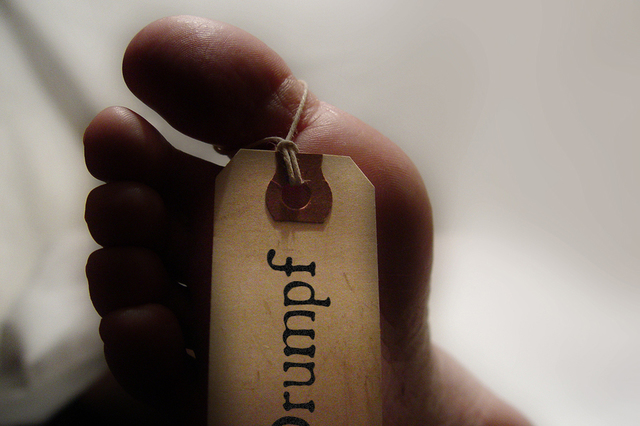
Brooklyn-based writer Mark Wagstaff recently took Third Prize in our Fall/Winter Fiction Contest. We spoke with him about his prizewinning story, “Emmaus,” about writing in general, and about what he has up his sleeve next.
“Emmaus” involves a British police detective forced off duty by encroaching dementia. It manages to sustain the voice and atmosphere of noir fiction even as we sense that much of the peril the main character faces is of his own making. Reading the story is like watching a high-wire act. As a writer, how did you approach and maintain that delicate balance?
My mother’s memories were lost to dementia, so I didn’t want that aspect of the story to be merely a device. Thinking of that, I conceived of the story as a journey that could only run one way. I was fascinated by the idea of a man moving forward in space, but forgetting himself in time, until there was no possibility of return. I was also pondering the effect which Philip K. Dick achieves in Ubik, where (spoiler alert) the action regresses so that by the time Joe Chip gets what he wants, it’s become useless.
In “Emmaus,” Detective Inspector Crawford believes that he’s still the tough, resourceful figure that we presume he once was, and that belief leads him into a situation from which he’s not equipped to escape. He talks tough, but he can’t remember people’s names anymore. I aimed to maintain a sense of pathos around Crawford. On the face of it, he’s on the right track and we want him to succeed. But he’s beyond the point of return.
You very effectively put the reader in the head of a character who can’t always recall what he’s doing from one moment to the next. Did you set any ground rules for yourself about what Crawford could and could not remember?
In UK law enforcement, the police notebook retains a special status. It’s a valuable object and a controlled document, with rules around what is recorded and how. Information in a police notebook is admissible in court and the pages are generally waterproof and untearable. It’s plausible that Crawford would use a notebook to record his activities and what he finds. That would be second nature. So a ground rule around use of the notebook grew from his situation. In a sense, he can fool himself that he’s not writing reminders but recording evidence, as he would anyway.
A general effect of some kinds of dementia is that short-term memory is lost relatively early, but longer-term memory is preserved for a time. Crawford remembers his wife. He remembers the tough-guy way he used to speak and that he is a policeman. Crucially, he remembers what he is trying to find out, the truth about Emma-Jane Garside’s death, although he is perhaps hazy on why he wants to find that out. He believes without question that he is on a case.
He is less clear about the people he is speaking with on his journey, especially those at the hotel. They blend into a formless mass because they are ephemeral to him. He loses track of outside points of reference. Once he leaves London he’s adrift in a continuous present. It isn’t even clear what he plans to do with Hugo Garside, whether Crawford thinks he could arrest him. Crawford has lost the power of logical decision making and with it any sense of the outcome that he’s trying to achieve. There’s no partner waiting in a car, there’s no radio in his pocket. He doesn’t really appreciate that he’s a long way from home and without backup.
In your story, Emmaus is the name of an ill-fated showjumping horse who figures in D.I. Crawford’s investigation. In the New Testament, Emmaus is the destination of two disciples who fail to recognize the true identity of their traveling companion until long after they should have. Are we wrong to look for meaning in that connection?
The choice of name was deliberate. Luke tells the story of two men on a road who encounter a stranger. This is somebody they ought to recognize, but cannot because it isn’t logical for that person to be there. When they do recognize their companion, it’s too late. I was thinking about those two men wanting something that could not be and also prevented from seeing what was there. That notion of following the road and not understanding what one sees was suggestive.
Layered onto that, the geography of Luke’s account is troublesome. There is no Emmaus sixty furlongs from Jerusalem. So the men are on the road to a place that isn’t there, adding to the dislocation of the story. A journey with strangers to nowhere.
When you sit down to write a story like “Emmaus,” do you know where it’s heading, or is the experience as much a journey of discovery as it is for your characters? How much do you know about the connections between your characters at the outset of the process?
I like to have an idea of the destination before I start a story, even if the route isn’t entirely clear. “Emmaus” is a journey into forgetting, and so I knew that Crawford would need to end in oblivion. It also seemed fitting that everyone he meets on the road is trying to obstruct him. The mission makes sense only in his mind; he finds no supporters along the way because what he is doing is, objectively, senseless.
A novel has multiple relationships but I find that short stories tend to be about one person, maybe two at most. Here, the second character is Emma-Jane Garside whose memory remains with Crawford and whose life is revealed in small clues. With some stories, I start out knowing who the main character will meet and why, usually because some plot points are already worked out. Perhaps fittingly, “Emmaus” was more vague in its conception. I set Crawford on the road and looked to see who would come along. Hugo Garside was the real surprise. He bounced fully formed into the story with his hearty malevolence and waxed jacket. I’ve spent time in rural areas, and Hugo Garside is every self-inflated individual who owns a few thousand acres and thinks that makes him special.
What questions about human behavior and experience interest you as a writer?
I’m beguiled with insecurity, with tenuousness, with people who have a distinct take on the world that doesn’t fit evidence or sense. I’m fascinated by why people do things that are not to their advantage and why people continue to do things long after any benefit to their lives has been exhausted.
I’m interested in life on the margins, in what’s down the rabbit hole. In people who always seem to be passing through without fixed destination or purpose. The choices that people make are endlessly fascinating, and the way that a chain of choices can direct a life almost without thought. I love people who collect unlikely things and know everything about those things.
I find it harder to talk with people who want only to talk about mortgages, retirement plans, the fuel efficiency of their vehicle or how they’re redesigning their kitchen. I used to nod and smile politely, but fortunately grew too old for that.
How did you begin writing? What writers and books have been influential for you, not just on your style but on your subject matter?
It’s a cliché really. I was that sickly child—I had asthma before it was fashionable—who spent a lot of time reading. My earliest reads were the obvious ones for an English kid of my generation: Tolkien, T.H. White, the wonderful Alan Garner. Anyone who wants to understand how the past of screwed-up families dictates their present should read The Owl Service. From there, I discovered Dickens and the masterful ghost stories of M.R. James. Fairly typical for my generation and generally working-class background.
I suppose I began writing at school but, for various reasons, didn’t take to it seriously until my thirties. That’s when I really started to read short stories, from the classics like Blackwood and Mann, through to Ring Lardner, Raymond Carver and on. Which is a very male and very white list of course. We shouldn’t forget how narrow our literary upbringing used to be.
For subject matter, a lot of pulpy crime and sci-fi comes into the mix. I watched a ton of TV as a kid and soaked up hard-boiled cop shows.
I must also mention Iris Murdoch, whose novels were a revelation to me when I found them. The Sandcastle sticks in my mind as a great portrayal of people whose needs are betrayed by their emotional equipment. It’s also where I got the notion of using weather to underscore characters’ feelings. The Time of the Angels is a stunning exercise in emotional claustrophobia, and the reviewers who didn’t like it back then had no clue what they were reading.
You’ve been writing and publishing for many years already, and now you’re pursuing an MFA at the New School. What prompted you to make that leap now? Have your studies changed the way you approach writing?
When I was offered a place at The New School, I pictured myself having a bar-room conversation years from now. I imagined myself saying, “I was offered a place on an MFA in New York. I didn’t take it.” Just hearing those words aloud convinced me I had to take up the offer.
The New School is a wonderfully diverse and energizing place to write. Being together with talented and aspirational people from all over the world is a tremendous advantage for a writer. I meet younger writers who are discovering things it took me years to figure out and that is all to the good. I’m approaching my work with renewed resolve and with my eyes on new horizons. Wherever we are in life, it’s far too easy just to drift along. Do that, you get more of the same. That’s why it’s important to take all those leaps.
As Deanna Durbin sang all those decades ago, “I want to walk a garden wall/Especially a wall that’s tall/And if I fall I fall, that’s all.”
What are you working on next, and what can we look forward to seeing soon?
I have a couple of novels more or less complete and enough stories for another collection. When they will be published is up to the kindness of publishers and editors. I never expect anything to get published, which is why I’m always amazed and grateful when things are picked up.
I’d say that getting published is the second greatest feeling in the world. The greatest is when a reader takes the trouble to get in contact, to say that something moved them or resonated with them. That connection with another person is priceless. It’s what we’re in it for.
Read “Emmaus,” Mark Wagstaff’s prizewinning story, and see where his leap has taken him.


